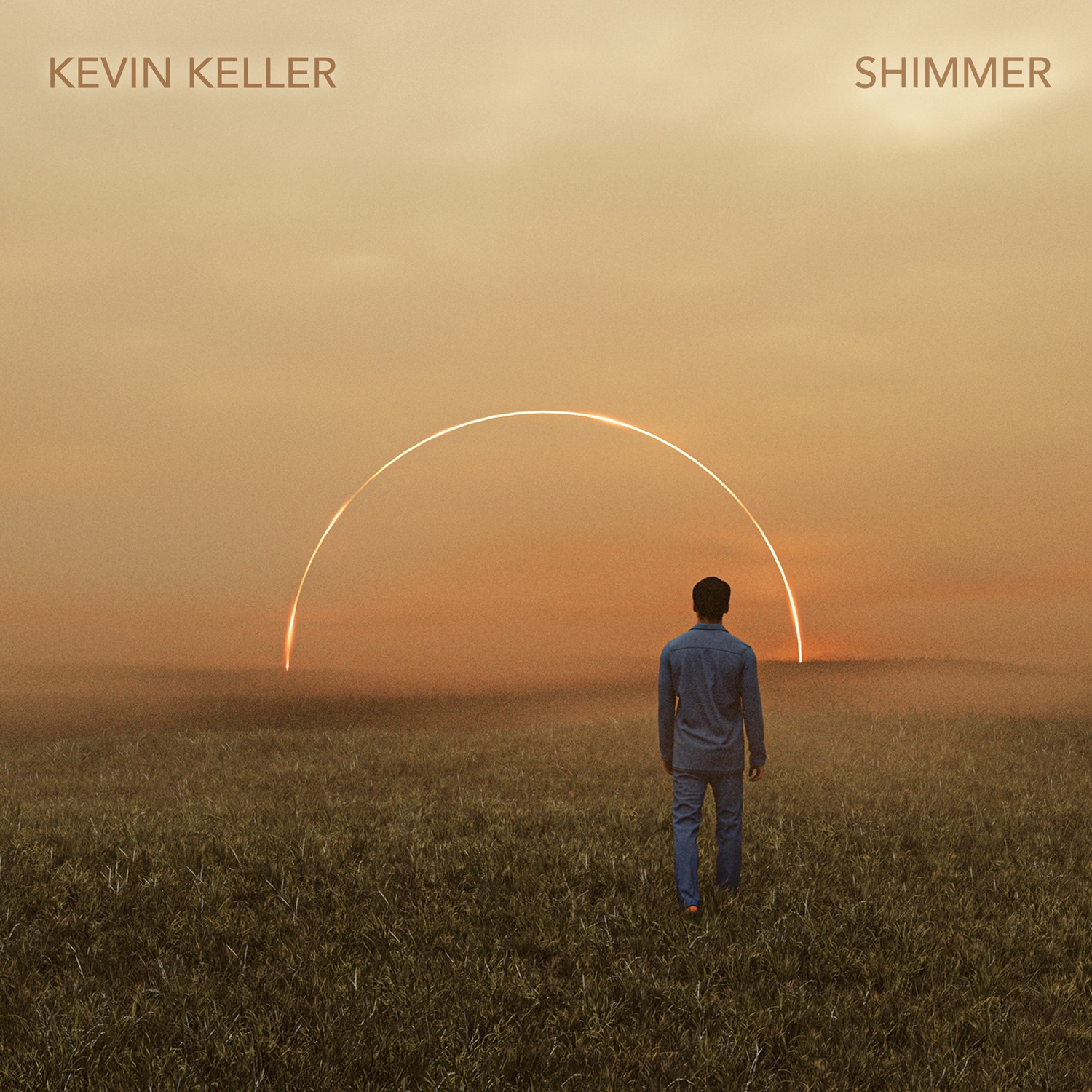
Longtime followers of me on Progarchy know that I am a huge fan of musician/composer Kevin Keller (See my earlier posts here and here.) Keller’s extraordinary The Front Porch Of Heaven was one of my favorite albums of 2020. I call it extraordinary, because he recorded it in the aftermath of having open heart surgery, and it is an aural odyssey of his experience.
Not one to rest on his laurels, Keller is set to release a new album, Shimmer on September 17, 2021. It continues his winning streak and illustrates Keller’s remarkable ability to write and record consistently excellent “ambient chamber music”. The interesting twist to Shimmer is that it is Keller’s response to the RPM Challenge, where musicians try to record an entire album from start to finish in the 28 days of February. As he wrote the songs, Keller solicited feedback from his fans on social media, and incorporated their suggestions into the compositions. The result is a surprisingly cohesive and organic-feeling collection of tracks.
The first song, Orchards, kicks things off with a bouncy piano riff that is reminiscent of Minimalist masters such as Steve Reich or John Adams. It’s an energetic track that allows a beautiful melody to develop on top of the rhythmic foundation. One of Keller’s strengths is his tasteful deployment of analog synthesizers, and Shimmer as a whole is a perfect example of that strength. While the piano is the lead instrument on most tracks, the synths provide a bed of ambience that support and enhance the songs, not overwhelm them.
Inverness, the second song, is one of my favorites. It begins with a slow, stately theme that is almost Enoesque in its simplicity and builds, note-by-note, into a fine melody that picks up steam until it fills the soundstage completely. There are subtle bass tones that are almost below the threshold of hearing (at least my threshold!), and they add much power to the song. After the music reaches an emotional crescendo, it gradually tapers off into the ether.
The third track is also the title track, and the best phrase to describe is, well, shimmeringly beautiful. It is a 10-minute small masterpiece of restraint. Keller uses every second to carefully develop the composition before the listener’s ears. Over a simple piano ostinato, some wordless female vocals float angelically, as more musical motifs enter, courtesy of woodwind-like synths. Eventually, some more propulsive elements take over, as the piano playing responds energetically. At the 7:15 mark, the party winds down, and the final couple of minutes are devoted to a graceful, spacier recapitulation of the main theme. I could listen to Shimmer all day on repeat and never tire of it.
“Side Two” opens with Bridges, a fine example of Keller’s ability to craft a gorgeous melody. Bridges is 21st century romanticism at its best: it conveys a wistful longing without a hint of saccharine sentimentality. And just as the listener is getting lost in its beauty, it’s gone.
Ithaca is a very ambient, spacey track with synth strings playing extended notes under a delicate theme played on virtual piano. There is a sense of hushed anticipation to this track; you have to listen closely to even hear the theme.
Riverbend, at 8:50, is the second longest song. It brings to my mind classic Tangerine Dream (think Risky Business soundtrack) with its insistent, burbling synths. It eventually develops into quite a majestic piece of music.
Shimmer closes with Delta, which is the most “traditional” sounding song on the album. A virtual piano plays the main theme, which is picked up by various analog synths. The production builds until the final minute, when a lone synth plays a variation on the theme into the fadeout.
Shimmer is another triumph for Kevin Keller, who is one of the most talented musician/composers working today. It is even more remarkable, considering he wrote and recorded the entire album by himself in a mere 28 days. The production is outstanding, and Keller’s masterful use of analog synthesizers lends a warmth and intimacy to his music that many other electronic artists simply can’t achieve.
Shimmer will be released on both CD and vinyl. You can preorder it here. If you appreciate intelligent, well-crafted music that straddles the boundary between melodic ambient and classical music, then there is no other artist who creates more satisfying work than Kevin Keller.
You can preview the album here: https://soundcloud.com/kevin_keller/sets/rpm-2021-new-album




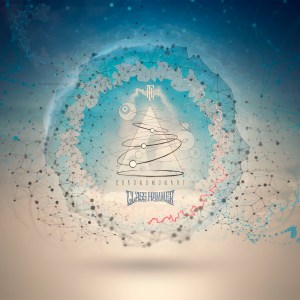
 For some reason yesterday, it popped into my head to pull out Catherine Wheel’s 1997 Adam and Eve for a spin in the CD player. I had not listened to it in years, but four consecutive listens later, I am compelled to share my love of this album. I think it is because it is the missing link between classic Pink Floyd, late-era Talk Talk, and ’90s Britpop, three of my favorite genres of music. And yes, it is definitely proggy!
For some reason yesterday, it popped into my head to pull out Catherine Wheel’s 1997 Adam and Eve for a spin in the CD player. I had not listened to it in years, but four consecutive listens later, I am compelled to share my love of this album. I think it is because it is the missing link between classic Pink Floyd, late-era Talk Talk, and ’90s Britpop, three of my favorite genres of music. And yes, it is definitely proggy!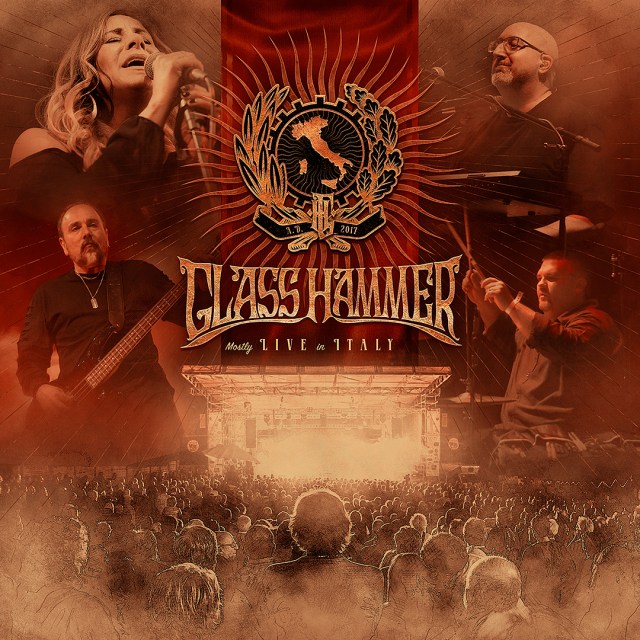
 Released in 2001, Chronicles is just a collection of music videos Rush made for Hemispheres through Hold Your Fire. It was originally released on VHS, and the picture quality is correspondingly poor. Anyway, it has been rendered obsolete due to YouTube. Highlight: “The Big Money” video, with primitive computer graphics that were amazing for the time, and Alex Lifeson looking like he just stepped off the set of Miami Vice. Easter eggs: if you hit the skip forward button after the last video, you can access two more “hidden” videos for “The Enemy Within” and “Afterimage”.
Released in 2001, Chronicles is just a collection of music videos Rush made for Hemispheres through Hold Your Fire. It was originally released on VHS, and the picture quality is correspondingly poor. Anyway, it has been rendered obsolete due to YouTube. Highlight: “The Big Money” video, with primitive computer graphics that were amazing for the time, and Alex Lifeson looking like he just stepped off the set of Miami Vice. Easter eggs: if you hit the skip forward button after the last video, you can access two more “hidden” videos for “The Enemy Within” and “Afterimage”. Replay x3 (2006) is a very nice collection of two shows that were originally on VHS (Exit Stage Left and A Show Of Hands), plus a previously unreleased video of a concert from their Grace Under Pressure tour. [Update: Rush fan Kevin Williams pointed out to me (see comment below) that the Grace Under Pressure concert was available on VHS via special order.] In these days of HD Blu-Ray, the picture and sound quality leave something to be desired, but that’s more than made up for by the passion of Rush playing at the peak of their power. A CD of the Grace Under Pressure show is included, as well as reproductions of the three tour programs.
Replay x3 (2006) is a very nice collection of two shows that were originally on VHS (Exit Stage Left and A Show Of Hands), plus a previously unreleased video of a concert from their Grace Under Pressure tour. [Update: Rush fan Kevin Williams pointed out to me (see comment below) that the Grace Under Pressure concert was available on VHS via special order.] In these days of HD Blu-Ray, the picture and sound quality leave something to be desired, but that’s more than made up for by the passion of Rush playing at the peak of their power. A CD of the Grace Under Pressure show is included, as well as reproductions of the three tour programs. Rush In Rio (2003) is a video of a concert in Rio de Janeiro. The audience of 40,000 people almost drown out the music, their nonstop roar is so deafening. As a result, the band sounds like they are playing in a tunnel. However, there is undeniable energy in their performance. This tour was in support of Vapor Trails, the album that signaled the renaissance of Rush as a working unit after Neil’s personal tragedies. Most Rush fans thought they would never see Neil, Geddy, and Alex perform again, so the ecstatic reception given them by Brazil is understandable. Easter eggs: A. On Main Menu, press 2; when you see the picture for the drum solo, press Menu; back at Main Menu, press 1; when you see the picture for YYZ, press Menu; at Main Menu, press 2; when you see the drum solo picture, press Menu; now the Main Menu shows “Special Bonus: Anthem 1975”. B. In the documentary, when Alex mentions By-Tor, press enter, and the By-Tor Movie will play.
Rush In Rio (2003) is a video of a concert in Rio de Janeiro. The audience of 40,000 people almost drown out the music, their nonstop roar is so deafening. As a result, the band sounds like they are playing in a tunnel. However, there is undeniable energy in their performance. This tour was in support of Vapor Trails, the album that signaled the renaissance of Rush as a working unit after Neil’s personal tragedies. Most Rush fans thought they would never see Neil, Geddy, and Alex perform again, so the ecstatic reception given them by Brazil is understandable. Easter eggs: A. On Main Menu, press 2; when you see the picture for the drum solo, press Menu; back at Main Menu, press 1; when you see the picture for YYZ, press Menu; at Main Menu, press 2; when you see the drum solo picture, press Menu; now the Main Menu shows “Special Bonus: Anthem 1975”. B. In the documentary, when Alex mentions By-Tor, press enter, and the By-Tor Movie will play. R30 (2005) is from a performance in Frankfurt, Germany, and it’s excellent. The sound is a 5.1 mix, and the setlist is terrific. The 2DVD/2CD package also includes a ton of special features that span Rush’s entire career: interviews, Juno Hall of Fame induction, and live performances going way back to 1970s television shows. Easter eggs: A. In disc 2, press the right arrow several times, you will see an option, “Rush hits St. John’s”, which is a bunch of fan interviews. B. In disc 2 in the interviews menu, navigate to the lower right corner. Press the right arrow several times, and the figure in shadow will light up in yellow. This lets you access “Alex’s Interview for Artist of the Decade” (which is hilarious, BTW).
R30 (2005) is from a performance in Frankfurt, Germany, and it’s excellent. The sound is a 5.1 mix, and the setlist is terrific. The 2DVD/2CD package also includes a ton of special features that span Rush’s entire career: interviews, Juno Hall of Fame induction, and live performances going way back to 1970s television shows. Easter eggs: A. In disc 2, press the right arrow several times, you will see an option, “Rush hits St. John’s”, which is a bunch of fan interviews. B. In disc 2 in the interviews menu, navigate to the lower right corner. Press the right arrow several times, and the figure in shadow will light up in yellow. This lets you access “Alex’s Interview for Artist of the Decade” (which is hilarious, BTW). Snakes and Arrows Live (2008) is a 3-disc set that was filmed in Holland. The performance is top-notch – the boys have two albums under their belts since the return of Neil, and they are firing on all cylinders. This set also includes one of the funniest special features Rush ever made: the mini-movie “What’s That Smell”, featuring Harry Satchel (aka Geddy Lee). Watching Geddy trying to stay serious while Alex is goofing off around him is worth the price of the whole thing.
Snakes and Arrows Live (2008) is a 3-disc set that was filmed in Holland. The performance is top-notch – the boys have two albums under their belts since the return of Neil, and they are firing on all cylinders. This set also includes one of the funniest special features Rush ever made: the mini-movie “What’s That Smell”, featuring Harry Satchel (aka Geddy Lee). Watching Geddy trying to stay serious while Alex is goofing off around him is worth the price of the whole thing.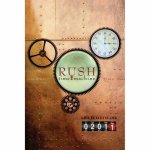 Time Machine (2011) is a one-disc set of a performance in Cleveland, Ohio. No album was released between this tour and Snakes and Arrows, but interestingly they perform “BU2B” and “Caravan” from the not-yet-released Clockwork Angels. The mini-movie for this tour is another hysterical production: The ‘Real’ History of Rush, which takes place in an alternate universe where Alex is an obese sausage lover, Geddy is a cook in a diner, and Neil is a cop. The band playing “The Spirit of Radio” is a polka trio called Rash. Lots of puns and silly sausage jokes ensue.
Time Machine (2011) is a one-disc set of a performance in Cleveland, Ohio. No album was released between this tour and Snakes and Arrows, but interestingly they perform “BU2B” and “Caravan” from the not-yet-released Clockwork Angels. The mini-movie for this tour is another hysterical production: The ‘Real’ History of Rush, which takes place in an alternate universe where Alex is an obese sausage lover, Geddy is a cook in a diner, and Neil is a cop. The band playing “The Spirit of Radio” is a polka trio called Rash. Lots of puns and silly sausage jokes ensue.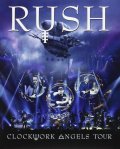 Clockwork Angels Tour (2013) is definitely one of their best. While the first set features some rarely played songs like “The Body Electric”, it’s the second set where things really take off. Augmented by an eight-piece string section, Rush performs the
Clockwork Angels Tour (2013) is definitely one of their best. While the first set features some rarely played songs like “The Body Electric”, it’s the second set where things really take off. Augmented by an eight-piece string section, Rush performs the 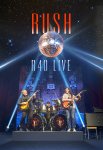 And so we come to the end of the line – R40 Live (2015). A very special set that covers practically all phases of Rush’s career. On every tour, they included creative props on their stage (dryers, chicken roasters, giant tube amps), but this tour is brilliant: start with all the trappings of an arena production, and gradually pare it down until it’s just a couple of amps on chairs in a school auditorium. You have to admire a band that goes out on their own terms with such style.
And so we come to the end of the line – R40 Live (2015). A very special set that covers practically all phases of Rush’s career. On every tour, they included creative props on their stage (dryers, chicken roasters, giant tube amps), but this tour is brilliant: start with all the trappings of an arena production, and gradually pare it down until it’s just a couple of amps on chairs in a school auditorium. You have to admire a band that goes out on their own terms with such style.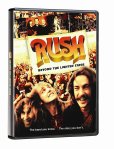 Bonus! Rush Beyond The Lighted Stage (2010) is a documentary of the band, made with their full coöperation, and it is a sheer delight. Lots of footage from vintage performances, interviews with everyone connected with the band, and tributes from other musicians. What comes through clearly is the deep bond the three men have with each other, and the humor that has kept them grounded for 40 years. The Dinner with the Band at a Hunting Lodge segment is uproariously funny and not to be missed.
Bonus! Rush Beyond The Lighted Stage (2010) is a documentary of the band, made with their full coöperation, and it is a sheer delight. Lots of footage from vintage performances, interviews with everyone connected with the band, and tributes from other musicians. What comes through clearly is the deep bond the three men have with each other, and the humor that has kept them grounded for 40 years. The Dinner with the Band at a Hunting Lodge segment is uproariously funny and not to be missed. If you’re missing King’s X, then this one will satisfy your craving. Ray Luzier (KoRn) is on drums, George Lynch (Dokken & Lynch Mob) is on guitar, and Doug Pinnock (King’s X) is on bass and vocals. This is their second album, and it is much more varied in its music styles than their debut. I never was into Dokken, but George Lynch’s guitar work is killer -especially on “Breakout”.
If you’re missing King’s X, then this one will satisfy your craving. Ray Luzier (KoRn) is on drums, George Lynch (Dokken & Lynch Mob) is on guitar, and Doug Pinnock (King’s X) is on bass and vocals. This is their second album, and it is much more varied in its music styles than their debut. I never was into Dokken, but George Lynch’s guitar work is killer -especially on “Breakout”. I give Grimspound the edge over its sister album, The Second Brightest Star. What a great collection of tributes and vignettes of everything that is good about Great Britain. Using small details to convey big ideas is really difficult, but BBT are masters and make it look easy.
I give Grimspound the edge over its sister album, The Second Brightest Star. What a great collection of tributes and vignettes of everything that is good about Great Britain. Using small details to convey big ideas is really difficult, but BBT are masters and make it look easy. Wow, when I first heard this, I wondered who or what lit a fire under this group’s collective backside. After watching the excellent film that accompanies this recording, I have to say it’s having Gavin Harrison behind the drum kit. As good as Pineapple Thief’s 2016 album Your Wilderness is, I think the versions from this show are better: tight, energetic, and riskier. And if you ever wondered where Bruce Soord came up with the band’s name, now you can find out. By the way, every song from Your Wilderness is performed here, except for “Where We Stood”. Go figure.
Wow, when I first heard this, I wondered who or what lit a fire under this group’s collective backside. After watching the excellent film that accompanies this recording, I have to say it’s having Gavin Harrison behind the drum kit. As good as Pineapple Thief’s 2016 album Your Wilderness is, I think the versions from this show are better: tight, energetic, and riskier. And if you ever wondered where Bruce Soord came up with the band’s name, now you can find out. By the way, every song from Your Wilderness is performed here, except for “Where We Stood”. Go figure. A lot of us fans of the classic Spock’s Beard lineup never thought we would see them reunite, let alone perform the double-album masterpiece, Snow. Well, Neal Morse managed to get all the Beardsters – past and current – together at his 2016 MorseFest, and they delivered a tremendous performance of Snow in its entirety. I’m probably biased (because I was there), but it is quite an emotional experience.
A lot of us fans of the classic Spock’s Beard lineup never thought we would see them reunite, let alone perform the double-album masterpiece, Snow. Well, Neal Morse managed to get all the Beardsters – past and current – together at his 2016 MorseFest, and they delivered a tremendous performance of Snow in its entirety. I’m probably biased (because I was there), but it is quite an emotional experience. I approached this set with trepidation – it is the first recordings of Yes without the late Chris Squire participating. However, as I got into the music, I was very pleasantly surprised. Jon Davison does an excellent job on vocals and acoustic guitar, while Billy Sherwood fills Squire’s huge shoes. Steve Howe is still full of fire, and Geoff Downes is uniformly excellent on keyboards. They perform all of Drama (one of my favorite Yes albums), as well as “The Revealing Science of God” and “Ritual” from Topographic Oceans. Add in “And You and I”, “Heart of the Sunrise”, “Leaves of Green”, “Roundabout”, and “Starship Trooper”, and you have a set to satisfy any Yes lover. It definitely helps that Jay Schellen was able to play drums and assist Alan White. God bless him, but Alan’s timekeeping has gotten a little shaky over past few years. That said, this is a surprisingly strong set of performances from Yes.
I approached this set with trepidation – it is the first recordings of Yes without the late Chris Squire participating. However, as I got into the music, I was very pleasantly surprised. Jon Davison does an excellent job on vocals and acoustic guitar, while Billy Sherwood fills Squire’s huge shoes. Steve Howe is still full of fire, and Geoff Downes is uniformly excellent on keyboards. They perform all of Drama (one of my favorite Yes albums), as well as “The Revealing Science of God” and “Ritual” from Topographic Oceans. Add in “And You and I”, “Heart of the Sunrise”, “Leaves of Green”, “Roundabout”, and “Starship Trooper”, and you have a set to satisfy any Yes lover. It definitely helps that Jay Schellen was able to play drums and assist Alan White. God bless him, but Alan’s timekeeping has gotten a little shaky over past few years. That said, this is a surprisingly strong set of performances from Yes. Holy cow, this is a fun concert to watch! I wish I’d been there in June of this year when Jeff Lynne, supported by a crack band, played songs from every phase of his career, including The Traveling Wilburys. The love for Jeff from the huge crowd is evident, and he delivers an outstanding performance. I had forgotten just how many popular (and beautiful) songs he’s written. Takes me back to my high school days when ELO’s music was inescapable on the radio. How far we have fallen…. Anyway, this show had me grinning from ear to ear from start to finish.
Holy cow, this is a fun concert to watch! I wish I’d been there in June of this year when Jeff Lynne, supported by a crack band, played songs from every phase of his career, including The Traveling Wilburys. The love for Jeff from the huge crowd is evident, and he delivers an outstanding performance. I had forgotten just how many popular (and beautiful) songs he’s written. Takes me back to my high school days when ELO’s music was inescapable on the radio. How far we have fallen…. Anyway, this show had me grinning from ear to ear from start to finish.